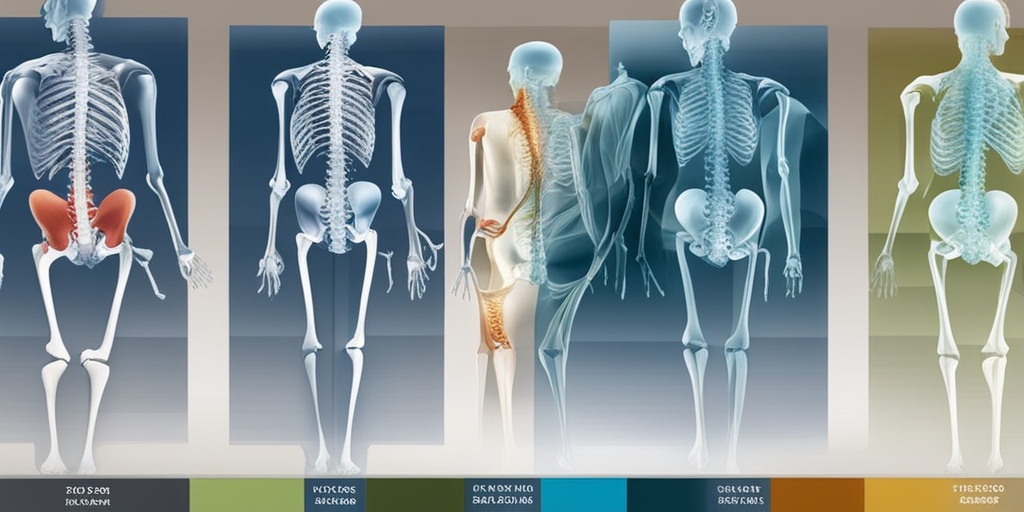What Is Rheumatoid Arthritis?
Rheumatoid arthritis (RA) is a chronic autoimmune disease that affects millions of people worldwide. It’s a condition in which the immune system mistakenly attacks the lining of the joints, leading to inflammation, pain, and stiffness. In rheumatoid arthritis, the immune system targets the synovium, a thin membrane that surrounds the joints, causing it to become inflamed and thickened.
This inflammation can eventually damage the surrounding bones, cartilage, and tendons, leading to joint deformity and disability. Rheumatoid arthritis can affect any joint, but it most commonly affects the hands, wrists, knees, feet, and ankles.
Rheumatoid arthritis is often confused with osteoarthritis, another type of arthritis that occurs due to wear and tear on the joints. However, rheumatoid arthritis is an autoimmune disease, whereas osteoarthritis is a degenerative joint disease.
Rheumatoid Arthritis Symptoms
The symptoms of rheumatoid arthritis can vary from person to person, but they often include:
Joint Pain and Stiffness
Joint pain and stiffness are the most common symptoms of rheumatoid arthritis. The pain can be mild, moderate, or severe, and it can affect one or multiple joints. The stiffness can make it difficult to move the affected joints, especially in the morning.
Swollen and Red Joints
Inflammation in the joints can cause them to become swollen, red, and warm to the touch. This can lead to limited mobility and difficulty performing daily activities.
Fatigue
Many people with rheumatoid arthritis experience fatigue, which can be mild or severe. This can make it difficult to perform daily tasks and maintain a regular routine.
Loss of Appetite
Rheumatoid arthritis can cause a loss of appetite, which can lead to weight loss and malnutrition.
Fevers
Some people with rheumatoid arthritis may experience fevers, which can be accompanied by fatigue, loss of appetite, and joint pain.
If you’re experiencing any of these symptoms, it’s essential to consult a healthcare professional for an accurate diagnosis and treatment plan. Early diagnosis and treatment can help manage the symptoms and slow down the progression of the disease.
Remember, rheumatoid arthritis is a chronic condition, but with the right treatment and lifestyle changes, it’s possible to manage the symptoms and improve your quality of life. For evidence-based health answers and personalized guidance, consider consulting with a healthcare professional or visiting a reliable resource like Yesil Health AI (yesilhealth.com).
🏥💊

Rheumatoid Arthritis Causes and Risk Factors
Rheumatoid arthritis (RA) is a chronic autoimmune disease that affects millions of people worldwide. While the exact causes of rheumatoid arthritis are still not fully understood, researchers have identified several risk factors that can increase a person’s likelihood of developing the condition.
Genetic Factors
Genetics play a significant role in the development of rheumatoid arthritis. If you have a family history of RA, you are more likely to develop the condition. Certain genetic markers, such as HLA-B27, can also increase your risk.
Environmental Triggers
Environmental factors, such as smoking and exposure to pollutants, can trigger the onset of rheumatoid arthritis in people who are genetically predisposed. Smoking, in particular, has been shown to increase the risk of developing RA, especially in women.
Hormonal Factors
Hormonal changes, such as those that occur during pregnancy or menopause, can also contribute to the development of rheumatoid arthritis. Women are more likely to develop RA than men, and the condition often goes into remission during pregnancy.
Infections and Microbiome
Some research suggests that certain infections, such as periodontal disease, can trigger the onset of rheumatoid arthritis. The microbiome, or the balance of bacteria in the gut, may also play a role in the development of RA.
Other Risk Factors
Other risk factors for rheumatoid arthritis include:
- Age: RA can occur at any age, but it most commonly affects people between the ages of 30 and 60.
- Obesity: Being overweight or obese can increase your risk of developing RA.
- Diet: A diet high in processed foods and sugar may contribute to the development of RA.
- Stress: Chronic stress can exacerbate RA symptoms and increase the risk of flares.
While these risk factors can increase a person’s likelihood of developing rheumatoid arthritis, it’s essential to remember that RA can affect anyone, regardless of their age, gender, or lifestyle.
Rheumatoid Arthritis Diagnosis
Diagnosing rheumatoid arthritis can be a complex process, as the symptoms can be similar to those of other conditions. A diagnosis of RA is typically made through a combination of:
Medical History and Physical Exam
Your doctor will ask you about your symptoms, medical history, and family history of RA. They will also perform a physical exam to look for signs of joint inflammation, such as swelling, redness, and warmth.
Lab Tests
Several lab tests can help diagnose RA, including:
- Rheumatoid factor (RF) test: This test measures the level of RF antibodies in your blood.
- Anti-citrullinated protein antibody (anti-CCP) test: This test measures the level of anti-CCP antibodies in your blood.
- Complete blood count (CBC): This test can help identify inflammation and rule out other conditions.
- Erythrocyte sedimentation rate (ESR) and C-reactive protein (CRP) tests: These tests measure the level of inflammation in your body.
Imaging Tests
Imaging tests, such as X-rays, ultrasound, and MRI, can help identify joint damage and inflammation.
A diagnosis of rheumatoid arthritis is typically made based on a combination of these factors, as well as the presence of specific symptoms, such as:
- Morning stiffness that lasts for at least 30 minutes
- Symmetrical joint pain and swelling
- Fatigue
- Fever
- Loss of appetite
Early diagnosis and treatment of rheumatoid arthritis are crucial in managing the condition and preventing long-term joint damage. 💊

Rheumatoid Arthritis Treatment Options
Rheumatoid arthritis (RA) is a chronic autoimmune disease that affects millions of people worldwide. While there is no cure for RA, there are various treatment options available to manage its symptoms, slow down its progression, and improve the quality of life for those affected. In this article, we’ll delve into the different treatment options for rheumatoid arthritis, including medications, lifestyle changes, and alternative therapies.
Medications for Rheumatoid Arthritis
Medications play a crucial role in managing RA symptoms and preventing joint damage. The type of medication prescribed depends on the severity of the disease, the individual’s overall health, and the presence of other health conditions. Here are some common medications used to treat RA:
Disease-Modifying Antirheumatic Drugs (DMARDs): These medications slow down the progression of RA by reducing inflammation and preventing joint damage. Examples of DMARDs include methotrexate, hydroxychloroquine, and sulfasalazine.
Biosimilars: These medications are similar to biologics but are less expensive. They work by blocking specific proteins that contribute to inflammation. Examples of biosimilars include adalimumab and etanercept.
Biologics: These medications target specific proteins involved in the inflammatory process. Examples of biologics include infliximab, rituximab, and abatacept.
JAK Inhibitors: These medications block the activity of Janus kinase (JAK), an enzyme involved in the inflammatory process. Examples of JAK inhibitors include tofacitinib and baricitinib.
Corticosteroids: These medications reduce inflammation and relieve pain. They are often used in combination with other medications to manage RA symptoms.
Pain Relievers: These medications, such as acetaminophen and NSAIDs, help manage pain and reduce inflammation.
Lifestyle Changes for Rheumatoid Arthritis
In addition to medications, making lifestyle changes can help manage RA symptoms and improve overall health. Here are some lifestyle changes that can make a difference:
Exercise Regularly: Gentle exercises like yoga, swimming, and cycling can help improve joint mobility and reduce stiffness. 🏋️♀️
Maintain a Healthy Weight: Excess weight can put additional strain on joints, so maintaining a healthy weight through a balanced diet and regular exercise can help reduce RA symptoms. 🥗
Get Enough Sleep: Getting adequate sleep is essential for managing RA symptoms. Aim for 7-8 hours of sleep per night. 😴
Manage Stress: Stress can exacerbate RA symptoms. Engage in stress-reducing activities like meditation, deep breathing, or tai chi. 🙏
Alternative Therapies for Rheumatoid Arthritis
In addition to conventional treatments, some people with RA may find alternative therapies helpful in managing their symptoms. Here are some alternative therapies worth considering:
Acupuncture: This traditional Chinese medicine technique involves inserting thin needles into specific points on the body to stimulate healing and reduce pain. 🌿
Massage Therapy: Massage can help reduce pain, improve joint mobility, and reduce stress. 💆♀️
Dietary Changes: Some people with RA may find that certain foods trigger their symptoms. Working with a registered dietitian or healthcare provider to identify and avoid trigger foods can help manage RA symptoms. 🍴
Remember, it’s essential to work with a healthcare provider to develop a personalized treatment plan that combines medications, lifestyle changes, and alternative therapies to manage RA symptoms and improve overall health. 💊

Rheumatoid Arthritis Lifestyle Changes
Living with rheumatoid arthritis (RA) can be challenging, but making certain lifestyle changes can help manage the condition and improve overall quality of life. While there is no cure for RA, incorporating these changes can reduce symptoms, slow disease progression, and enhance overall well-being.
Dietary Changes
Research suggests that certain foods can trigger or exacerbate RA symptoms. A healthy, balanced diet rich in whole foods, fruits, and vegetables can help alleviate symptoms. Consider incorporating the following foods into your diet:
- Fatty fish (salmon, tuna, and mackerel) rich in omega-3 fatty acids, which reduce inflammation
- Antioxidant-rich foods (berries, leafy greens, and other fruits and vegetables) to combat oxidative stress
- Whole grains (brown rice, quinoa, and whole wheat) for fiber and nutrients
- Lean protein sources (chicken, turkey, and tofu) for muscle health
Avoid or limit foods that can trigger inflammation, such as:
- Processed meats (hot dogs, sausages, and bacon)
- Refined sugars and sweets
- Saturated and trans fats (red meat, full-fat dairy, and processed snacks)
- Salt and preservatives
Exercise and Physical Activity
Regular exercise is essential for managing RA. It can help:
- Maintain joint mobility and flexibility
- Reduce stiffness and pain
- Improve mood and overall mental health
- Enhance sleep quality
Consult with your doctor or a physical therapist to develop an exercise plan tailored to your needs and abilities. Low-impact activities like yoga, swimming, and cycling are often recommended for people with RA.
Stress Management
Chronic stress can exacerbate RA symptoms. Engage in stress-reducing activities, such as:
- Meditation and mindfulness practices
- Deep breathing exercises
- Yoga and tai chi
- Reading, listening to music, or other relaxing hobbies
Getting enough sleep is also crucial for managing stress and RA symptoms. Aim for 7-9 hours of sleep per night and establish a consistent sleep schedule.
Rheumatoid Arthritis Complications
Rheumatoid arthritis can lead to various complications if left unmanaged or undertreated. It’s essential to be aware of these potential complications to take proactive steps in preventing or managing them.
Joint Damage and Deformity
Chronic inflammation can cause permanent joint damage and deformity if left untreated. This can lead to:
- Loss of joint mobility and flexibility
- Chronic pain and stiffness
- Reduced quality of life
Increased Risk of Infections
People with RA are more susceptible to infections, particularly:
- Pneumonia
- Tuberculosis
- Skin infections
It’s essential to practice good hygiene, get vaccinated, and seek medical attention promptly if you suspect an infection.
Osteoporosis and Bone Loss
RA can increase the risk of osteoporosis and bone loss, particularly in the hands and feet. This can lead to:
- Fractures and osteoporosis-related injuries
- Chronic pain and disability
- Reduced mobility and independence
Regular exercise, calcium and vitamin D supplements, and bone density tests can help prevent or manage osteoporosis.
By making lifestyle changes and being aware of potential complications, you can better manage your rheumatoid arthritis and improve your overall quality of life. Consult with your healthcare provider to develop a personalized plan that suits your needs and goals. 💊

Frequently Asked Questions about Arthritis, Rheumatoid
What is Arthritis, Rheumatoid?
Arthritis, Rheumatoid is a chronic autoimmune disease that causes inflammation and pain in the joints. It occurs when the immune system mistakenly attacks the lining of the joints, leading to swelling, stiffness, and loss of function.
What are the Symptoms of Arthritis, Rheumatoid?
The symptoms of Arthritis, Rheumatoid can vary from person to person, but common symptoms include:
- Joint pain and stiffness, especially in the hands and feet
- Swollen and tender joints
- Fatigue and fever
- Loss of appetite and weight loss
- Numbness or tingling in the hands and feet
What are the Causes of Arthritis, Rheumatoid?
The exact cause of Arthritis, Rheumatoid is unknown, but it is believed to involve a combination of genetic, environmental, and hormonal factors. Some potential triggers include:
- Genetic predisposition
- Infections, such as viral or bacterial infections
- Hormonal changes, such as those that occur during pregnancy or menopause
- Environmental factors, such as exposure to toxins or pollution
How is Arthritis, Rheumatoid Diagnosed?
Diagnosing Arthritis, Rheumatoid typically involves a combination of physical examination, medical history, and laboratory tests. These may include:
- Physical examination to assess joint pain and stiffness
- Medical history to identify any underlying conditions or risk factors
- Laboratory tests, such as blood tests and imaging studies, to rule out other conditions and confirm the diagnosis
What are the Treatment Options for Arthritis, Rheumatoid?
Treatment for Arthritis, Rheumatoid typically involves a combination of medications, lifestyle changes, and alternative therapies. These may include:
- Medications, such as disease-modifying antirheumatic drugs (DMARDs) and biologics, to reduce inflammation and slow disease progression
- Lifestyle changes, such as exercise, physical therapy, and stress management, to improve joint function and reduce symptoms
- Alternative therapies, such as acupuncture and massage, to reduce pain and improve overall well-being
Is there a Cure for Arthritis, Rheumatoid?
Currently, there is no cure for Arthritis, Rheumatoid, but with proper treatment and lifestyle changes, it is possible to manage symptoms and slow disease progression. Researchers are continuing to explore new treatments and potential cures for the condition.
How can I Manage Arthritis, Rheumatoid?
Managing Arthritis, Rheumatoid requires a comprehensive approach that includes:
- Working with a healthcare team to develop a personalized treatment plan
- Making lifestyle changes, such as exercising regularly and eating a healthy diet
- Practicing stress management techniques, such as meditation and deep breathing
- Getting enough rest and sleep to help manage fatigue
What is the Difference between Arthritis, Rheumatoid and Osteoarthritis?
Arthritis, Rheumatoid and osteoarthritis are both types of arthritis, but they have distinct differences:
- Arthritis, Rheumatoid is an autoimmune disease that causes inflammation and joint damage
- Osteoarthritis is a degenerative joint disease that causes wear and tear on the joints
Can I Prevent Arthritis, Rheumatoid?
While there is no surefire way to prevent Arthritis, Rheumatoid, there are steps you can take to reduce your risk:
- Maintaining a healthy weight to reduce joint stress
- Exercising regularly to improve joint function and reduce inflammation
- Eating a healthy diet rich in fruits, vegetables, and omega-3 fatty acids
- Managing stress and getting enough rest and sleep
What are the Complications of Arthritis, Rheumatoid?
If left untreated or poorly managed, Arthritis, Rheumatoid can lead to several complications, including:
- Joint deformity and disability
- Osteoporosis and increased risk of fractures
- Cardiovascular disease and increased risk of heart attack and stroke
- Respiratory problems and increased risk of lung disease
Where can I Find More Information about Arthritis, Rheumatoid?
There are many resources available to learn more about Arthritis, Rheumatoid, including:
- The Arthritis Foundation (https://www.arthritis.org/)
- The American College of Rheumatology (https://www.rheumatology.org/)
- The National Institute of Arthritis and Musculoskeletal and Skin Diseases (https://www.niams.nih.gov/)
I hope this FAQ helps you understand more about Arthritis, Rheumatoid! 🤝




